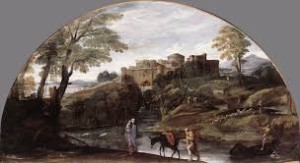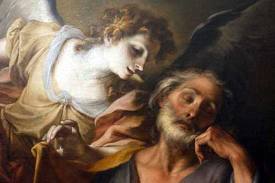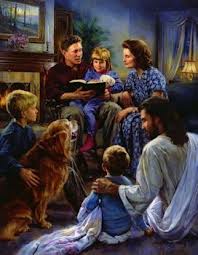
– 29-12-2019 –
The Holy Family of Jesus, Mary and Joseph
 Gospel Text: Matthew 2:13-15, 19-23
Gospel Text: Matthew 2:13-15, 19-23
vs.13 After they had left, the angel of the Lord appeared to Joseph in a dream and said, ‘Get up, take the child and his mother with you, and escape into Egypt, and stay there until I tell you, because Herod intends to search for the child and do away with him.’
vs.14 So Joseph got up and, taking the child and his mother with him, left that night for Egypt,
vs.15 where he stayed until Herod was dead. This was to fulfil what the Lord had spoken through the prophet: ‘I called my son out of Egypt.’
 vs.19 After Herod’s death, the angel of the Lord appeared in a dream to Joseph in Egypt
vs.19 After Herod’s death, the angel of the Lord appeared in a dream to Joseph in Egypt
vs.20 and said, ‘Get up, take the child and his mother with you and go back to the land of Israel, for those who wanted to kill the child are dead.’
vs.21 So Joseph got up and, taking the child and his mother with him, went back to the land of Israel.
vs.22 But when he learnt that Archelaus had succeeded his father Herod as ruler of Judaea he was afraid to go there, and being warned in a dream he left for the region of Galilee.
vs.23 There he settled in a town called Nazareth. In this way the words spoken through the prophets were to be fulfilled: “He will be called a Nazarene.”
********************************************
We have three sets of homily notes to choose from.
Please click on the one required or scroll down the page.
| 1. Michel de Verteuil | Lectio Divina with the Sunday Gospels – Year A |
| 2. Thomas O’Loughlin | Liturgical Resources for Advent & Christmastide |
| 3. John Littleton,
4 Donal Neary |
Journeying through the Year of Matthew
|
*******************************************************
Michel de Verteuil
Lectio Divina with the Sunday Gospels – Year A
www.columba.ie
Textual Comments
This passage is in three sections; they are all important for us, and we therefore need to look at them individually.
 In the first section, verse 13 Joseph is inspired by “an angel of the Lord”. He is told in a dream that he must “get up” at once, and take “the child and his mother with him”. They “escaped into Egypt” and stayed there until he was told, once again in a dream, that he could move back home to Israel. This was to save Jesus from being put to death by order of Herod who was then king of Israel. Herod’s purpose was to “search for the child”, and put him to death. We read about this search for Jesus later in the text, in verses 16 to 18, and we see Herod’s anger taken out on all who were born at that time.
In the first section, verse 13 Joseph is inspired by “an angel of the Lord”. He is told in a dream that he must “get up” at once, and take “the child and his mother with him”. They “escaped into Egypt” and stayed there until he was told, once again in a dream, that he could move back home to Israel. This was to save Jesus from being put to death by order of Herod who was then king of Israel. Herod’s purpose was to “search for the child”, and put him to death. We read about this search for Jesus later in the text, in verses 16 to 18, and we see Herod’s anger taken out on all who were born at that time.
The text brings out very well Matthew’s testimony to St Joseph. He was obedient to the word of the Lord – it did not really matter how it came to him.
Joseph stayed in Egypt for a long time. He waited “until Herod was dead”. This occurred around the year 4 AD, some years after the sad incident at Bethlehem.
According to Matthew, God called the young Messiah out of the land of Egypt, and the prophet reminds us of that. This was the country where his ancestors had lived and been persecuted for years. He was now to re-enact their destiny.
The evangelist then illustrates his narrative with a text found in the Bible. The prophet Hosea spoke of Israel as a child who was dearly loved by his heavenly Father. It was said of him, “When Israel was a child, I loved him and I called my son out of Egypt.” This is what happened to Jesus. He was God’s beloved Son and the Father called him “out of Egypt”.
We remember now situations in our own families. We too must allow ourselves, like Joseph, to be guided by God in all he wants us to do – for ourselves, and to help others we meet. Sometimes God will appear to us in a dream. Usually however it will be by some other intervention. It could be through friends who talk to us, or others we meet in our daily living.
In verses 19-23, the second part of the passage, Matthew tells us that after Herod died, the angel appeared to Joseph once more. As usual it was “in a dream”. He told Joseph to go back to the land of Israel, because “those who wanted him killed are now dead”.
Joseph responded immediately. He “got up” (notice the same words used as before) and he took the child and his mother and they headed back to Israel.
Joseph then learnt that Herod had bequeathed part of his country to his son, King Archelaus, who was now the ruler of the territory. Joseph was naturally afraid of the new king and so “was afraid to go there”. Once more, he was “warned in a dream” and he took the decision to go to Galilee, which was ruled by Herod’s son, Herod Antipas. There Joseph decided to settle in a little town called Nazareth.
Scripture prayer
“All this doctrinal wealth is focussed in only one direction, serving one another in our every condition, in our every ailment, in every way. In a certain way, the Church has proclaimed herself as the handmaid of humanity.” …Pope Paul VI quoted by Pope John Paul II in Sicily.
Lord, we thank you for St Joseph.
We pray that we too may be guided by what you have told us.
The manner will be unique to us, but we must be ready to recognize you.
Lord, we come to you in our various situations.
Some of us are single, some are celibates;
for others our original partner has gone from us or has divorced us.
Help us always to be guided by your intervention as St Joseph was,
to know that once we are led by you, all will be well for us.
 “The Word was made flesh in the incarnation, and ever since we have tried to make that flesh into Word again.” … Cardinal Martini
“The Word was made flesh in the incarnation, and ever since we have tried to make that flesh into Word again.” … Cardinal Martini
Lord, we often find ourselves in a lost situation.
We find ourselves in some Egypt or some other area we hadn’t bargained for.
Help us to be like Joseph and follow your way wherever you want to lead us.
Lord, when we know that our Herod is dead, it is time to make our way home.
Help us to follow the right way,
to know when we must move to another town where we will be known to be yours.
Jesus was called a Nazarene. Help us to be whoever you want us to be.
*********************************************************
3. Thomas O’Loughlin,
Liturgical Resources for Advent and Christmas
www.columba.ie
Introduction to the Celebration
In these days between Christmas Day and New Year’s Day we as the People of God spend time reflecting on just what the Christmas mystery tells us about God. We reflect that his Son has come among us: born as an infant at a particular moment in time, in a particular place, in a particular culture — this is Jesus our brother. Like each of us he had a unique set of relationships: with Mary, with Joseph, with the other people who lived around him. But with us, his followers, he established another unique relationship by making each of us a child of God. Let us call to mind how we have behaved as daughters and sons of the Father and how we may have injured our brothers and sisters.
Homily notes
1. Preaching immediately after Christmas seems to be just the straw that breaks the camel’s back: we have worked hard to prepare for Christmas Day, now there is a sense of a lull. This is perfectly natural because after a moment of stressed solemn time, there is the necessary moment of quiet. This time between Christmas and New Year is the time when in the liturgy we have the octave: the time for letting the mystery of Christmas slowly sink in. And this reflective, letting it sink in slowly quality must dominate the homily today. Moreover, many people are still away who are normally in the congregation, while there may still be visitors from elsewhere. So it does not feel like a normal Sunday morning.
 2.Moreover, there are other problems with preaching on this feast. First, it can draw out a mawkish piety: the lovely ideal family which will seem so far distant as to be irrelevant to many in the community whose relationships are far from ideal or for whom the Christmas period has been one of extra stress. Musing on families in a general way or speculating on a Galilean peasant family’s life two millennia ago may seem appropriate to the preacher but, especially if the preacher is a celibate, such musings just make for non-communication. Any breakdown in communication is especially sad today for in this period after Christmas there is the heightened awareness, by everyone taking part, of what is happening in the liturgy. This is the result of us still being in the wake of the great feast and the holiday period. Second, there is the moralist’s approach: this is really the day for speaking about the ‘Christian ideal’ of family life. What can then follow is a potted mix of injunctions and abstract ideals where theology (laced with canon law) is allowed free rein in lieu of a psychology of relationships or a sociological analysis of contemporary society. Whether or not this is well received, rejected, or ignored is beside the point: such speculation has no place in today’s liturgy for it supplants the purpose of the feast for an ulterior motive. The liturgy of Christmas is about our wonder at the incarnation and a loving reflection on its implications for us as Christians, and no other aim, even one so worthy as promoting the Christian notion of marriage, should deflect us. The Son of God made flesh, not as an abstract being labelled ‘human’, but as an individual with a specific history, Jesus the son of Mary and with Joseph as his father in their specific setting of a small town where Joseph worked as an artisan – this is the wonder we must recall today.
2.Moreover, there are other problems with preaching on this feast. First, it can draw out a mawkish piety: the lovely ideal family which will seem so far distant as to be irrelevant to many in the community whose relationships are far from ideal or for whom the Christmas period has been one of extra stress. Musing on families in a general way or speculating on a Galilean peasant family’s life two millennia ago may seem appropriate to the preacher but, especially if the preacher is a celibate, such musings just make for non-communication. Any breakdown in communication is especially sad today for in this period after Christmas there is the heightened awareness, by everyone taking part, of what is happening in the liturgy. This is the result of us still being in the wake of the great feast and the holiday period. Second, there is the moralist’s approach: this is really the day for speaking about the ‘Christian ideal’ of family life. What can then follow is a potted mix of injunctions and abstract ideals where theology (laced with canon law) is allowed free rein in lieu of a psychology of relationships or a sociological analysis of contemporary society. Whether or not this is well received, rejected, or ignored is beside the point: such speculation has no place in today’s liturgy for it supplants the purpose of the feast for an ulterior motive. The liturgy of Christmas is about our wonder at the incarnation and a loving reflection on its implications for us as Christians, and no other aim, even one so worthy as promoting the Christian notion of marriage, should deflect us. The Son of God made flesh, not as an abstract being labelled ‘human’, but as an individual with a specific history, Jesus the son of Mary and with Joseph as his father in their specific setting of a small town where Joseph worked as an artisan – this is the wonder we must recall today.
 3. The old dictum ‘God became man in Jesus Christ’ obscured the basic issue at the heart of this feast: God the Son did not become a ‘man’ or ‘human’ as we think of these as abstract categories – he became another unique individual with a history and a distinct identity. Just as you and I are unique, unrepeatable and distinct in our specific backgrounds and cultures and experiences, so too was Jesus. This is a celebration of the depths of the humanity of our Lord. But as Christians we also believe that we all share something that is equally deep with one another: each of us is a daughter or son of the Father. We are the children of God and we share this with Jesus as a member of his family. This is a conviction of faith in the loving reality of God that makes us brothers and sisters to one another and to Jesus. This is not some abstract notion of sharing in a common human nature. We may, as a matter of our philosophical perspective, hold that there is a common humanity and a common human nature which allows us to share experiences and joys and sufferings, but to call each other brothers and sisters in Christ is not simply to have a religious ‘take’ on human nature. To be brothers and sisters in Christ is to be distinct and unique creations with distinct vocations within the care of God, and to have the commonality of the love of the Father calling us as his people united in his Son – a union achieved in the mystery we recall at Christmas. Put bluntly, the secular world may promote the notion of ‘universal human brotherhood’ lfraternite) – and as responsible people in the world we should support this ideal as a way of overcoming wars, exploitation, oppression, and bringing help to anyone who suffers. But our Christian vision of the links that bind each individual to every other individual is both more rich – in that it stresses each’s uniqueness and more profound: we are brothers and sisters because each is a daughter or son of the Father, and it is through the Word that we are given this dignity.
3. The old dictum ‘God became man in Jesus Christ’ obscured the basic issue at the heart of this feast: God the Son did not become a ‘man’ or ‘human’ as we think of these as abstract categories – he became another unique individual with a history and a distinct identity. Just as you and I are unique, unrepeatable and distinct in our specific backgrounds and cultures and experiences, so too was Jesus. This is a celebration of the depths of the humanity of our Lord. But as Christians we also believe that we all share something that is equally deep with one another: each of us is a daughter or son of the Father. We are the children of God and we share this with Jesus as a member of his family. This is a conviction of faith in the loving reality of God that makes us brothers and sisters to one another and to Jesus. This is not some abstract notion of sharing in a common human nature. We may, as a matter of our philosophical perspective, hold that there is a common humanity and a common human nature which allows us to share experiences and joys and sufferings, but to call each other brothers and sisters in Christ is not simply to have a religious ‘take’ on human nature. To be brothers and sisters in Christ is to be distinct and unique creations with distinct vocations within the care of God, and to have the commonality of the love of the Father calling us as his people united in his Son – a union achieved in the mystery we recall at Christmas. Put bluntly, the secular world may promote the notion of ‘universal human brotherhood’ lfraternite) – and as responsible people in the world we should support this ideal as a way of overcoming wars, exploitation, oppression, and bringing help to anyone who suffers. But our Christian vision of the links that bind each individual to every other individual is both more rich – in that it stresses each’s uniqueness and more profound: we are brothers and sisters because each is a daughter or son of the Father, and it is through the Word that we are given this dignity.
4. So how do we communicate this new set of relationships that is established through the specific history of Jesus? For most of us the crib in the church is just there: one of the Christmas trimmings which might be referred to for the ‘children’s sake’ on Christmas Day but precious little afterward. Yet (see ‘The Crib, pp 156) this assembly is a wonderful collage of our basic memory of the entry of the Word into the creation. This is a day on which the crib can be exploited in the homily. People do not have to be actually looking at the crib while you speak – in fact it is better if they cannot see it during the homily (people using PowerPoint should have realised by now that if you leave the images on all the time the people stop listening to you and get caught up with what they see), everyone can remember what a crib looks like while you preach, and they can visit it afterwards.
5. Just reflect on the contradictions contained in the crib. First, we have a private family moment – the birth of Jesus – without the larger family nearby and with no hint that it has impact on those immediately around; yet we are told that this event is heralded by angels to shepherds as of momentous significance to humanity. Second, the inn is full, they have come on the wrong day at the wrong hour – and so has the baby for the equivalent of the ‘No vacancies’ sign is out and they have not ‘booked ahead’. The reference to the ‘no room in the inn’ (Lk 2:7) indicates a serious lack of planning, yet we see Luke quoting the whole history of humanity, back to Adam to show God’s planning, the prophets and John the Baptist preparing the way, and this birth being proclaimed as ‘the fall and rising of many in Israel’ (Lk 2:34). God’s planning is praised for its loving providence, yet events occur in a way that was determined by how many got to the inn that evening before them.
 6.So what do these contradictions mean? They show us that the mystery of God and our re-creation in the Christ is greater than our human minds. We are caught up in a mystery of love, but it does not bring ready answers and simply success. These contradictions make us reassess any preconceived ideas we might have about a ‘god’ or about religion. The Father does not act like a bullying superpower for whom we are playthings or puppets, but reveals himself in his Son coming among us as one of us. We live in the mystery of the revelation of God in the particularities of a human life: the vast plan for the incarnation, yet there was no room that night in the inn! Christianity is a religion of the absolute reign of God, but that takes the small person seriously and leans towards the powerless.
6.So what do these contradictions mean? They show us that the mystery of God and our re-creation in the Christ is greater than our human minds. We are caught up in a mystery of love, but it does not bring ready answers and simply success. These contradictions make us reassess any preconceived ideas we might have about a ‘god’ or about religion. The Father does not act like a bullying superpower for whom we are playthings or puppets, but reveals himself in his Son coming among us as one of us. We live in the mystery of the revelation of God in the particularities of a human life: the vast plan for the incarnation, yet there was no room that night in the inn! Christianity is a religion of the absolute reign of God, but that takes the small person seriously and leans towards the powerless.
7. If more members of your assembly are drawn to just go and look at the crib than usual, i.e. to reflect on the church’s memory of the coming of the Christ, then this is one of the times when you can check out if your communication has got through.
***********************************
John Litteton
Journeying through the Year of Matthew
www.Columba.ie
Gospel Reflection
Has there been disagreement in any of our homes this Christmas? Has anyone in our family been jealous, unkind, intolerant, and perhaps even violent? Have some of us felt upset or rejected during the last few days? Many of us can answer ‘Yes’ to at least one of these questions.
This is very natural, given the stress of coping with extra people and visitors, and the additional work involved during this festive season, although it would not happen if everyone was celebrating the true meaning of Christmas. Emphasising the preparations and the trimmings of Christmas usually serves to undermine our understanding of the magnificent truth that God became human and lived among us, which is what we are invited to think about on this feast.
Ideally, then, we would not focus on family antagonisms or anything else that would disrupt our peace of mind and soul. But such human failings are one reason why we need the Feast of the Holy Family of Jesus, Mary and Joseph, because the feast provides an opportunity to reflect on our family lives.
 We are reminded that the essence of good family and community life is respect. We are challenged to cherish and honour other family members. Experience teaches us that genuine family life exists only when everyone is sincere, compassionate, kind, humble, gentle, patient and forgiving.
We are reminded that the essence of good family and community life is respect. We are challenged to cherish and honour other family members. Experience teaches us that genuine family life exists only when everyone is sincere, compassionate, kind, humble, gentle, patient and forgiving.
These are the qualities that make family life pleasant and worthwhile. They ultimately derive from the authentic love that we have for God and one another. When family members live together in harmony, the home unquestionably provides the best environment for personal and communal faith development. Hence the home is often described as the domestic church.
At Christmas, families gather and exchange gifts. Christmas is meant to be a time of happiness and celebration. It ought to be a time of peace and goodwill. It would be wonderful if we could sustain this goodwill. Family life would thrive if everyone worked to make living together more enjoyable and refreshing.
Sadly, however, as Christmas and the Christmas holidays end, many of us will be tired, frustrated and angry. Some will have feelings of regret. Others will have only memories of desertion and violence. Celebrating Christ’s birth will have been meaningless.
 However, it is not too late to change. We can try to be truly human together as we encourage and influence one another in the name of Jesus. For instance, there may be a member of our family with whom we could be more patient. We could make a start with this person, imitating the self-sacrificing love of Christ and the example of the saints, by being kind to that awkward relative. After all, great things are often achieved in small ways.
However, it is not too late to change. We can try to be truly human together as we encourage and influence one another in the name of Jesus. For instance, there may be a member of our family with whom we could be more patient. We could make a start with this person, imitating the self-sacrificing love of Christ and the example of the saints, by being kind to that awkward relative. After all, great things are often achieved in small ways.
The same applies outside the boundaries of our human families. We, in the Church, are sisters and brothers in Jesus, and children of God our heavenly Father. Being members of God’s family, we attempt to help and strengthen other people. Again, we can model ourselves on the Holy Family and try to live in harmony and peace.
 Therefore, the Feast of the Holy Family reminds us that we are part of a human family and, equally, that we belong to God’s family. In each case there are privileges and responsibilities. In our human families and in God’s family, the Church, we work out our salvation together — as women, men and children living and working in love and peace. Let each one of us think of ways to make life more pleasant for other members in our family, and let us begin again today.
Therefore, the Feast of the Holy Family reminds us that we are part of a human family and, equally, that we belong to God’s family. In each case there are privileges and responsibilities. In our human families and in God’s family, the Church, we work out our salvation together — as women, men and children living and working in love and peace. Let each one of us think of ways to make life more pleasant for other members in our family, and let us begin again today.
For meditation
Take the child and his mother with you, and escape into Egypt,
and stay there until I tell you. (Mt 2:13)
****************************
Donal Neary SJ
Gospel Reflections
www.messenger.ie/bookshop/
Celebrating family life
We often remember the sacrifices our parents made for us. Financial generosity, giving their time, understanding us when we go wrong. The first family story of Jesus is a tough story – Joseph caring for him and Mary through the dangers of the journey into Egypt and back, like asylum seekers or refugees today fleeing from danger in their country.
We salute the love of parents, siblings, guardians, grandparents and extended families; we remember at different times of life how much they did for us and gave to us.
In the difficulties of family life today, the role of the church is to support family life of all kinds – with education, faith-formation, supporting political structures that support family life, being there for families in bad times like illness and death, and providing a place to celebrate family life in marriage and baptism. Parishes try to be committed to supporting family life.
Jesus came not only to be with us, but to care.  This is the call to the church – being in the world and being for the world.
This is the call to the church – being in the world and being for the world.
‘Joseph took the child and his mother/ He was a caring man, looking after them, making a huge difference to a small number of people – this is the message of love in the gospel and is the central message of the feast today.
Remember in prayer those in your family for whom you are grateful.
As you picture each person, say thanks to the Lord for him or her.
Lord, care for our families and may we in our families care for each other.
*********************